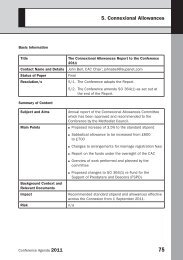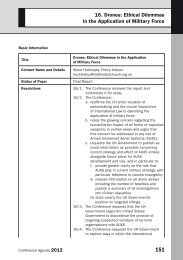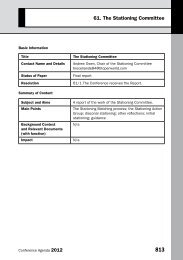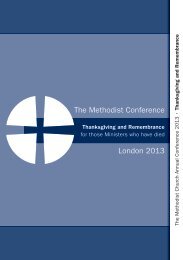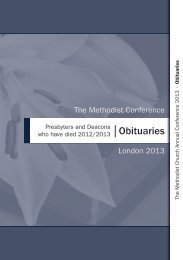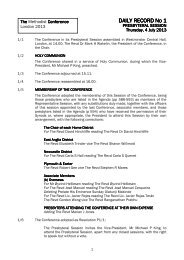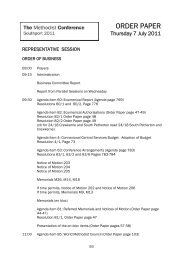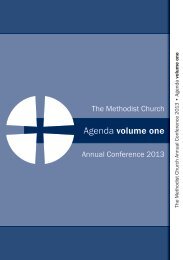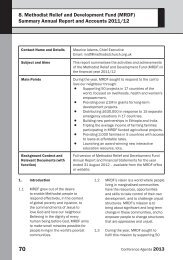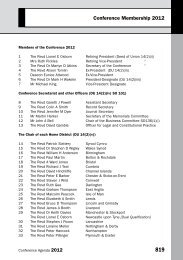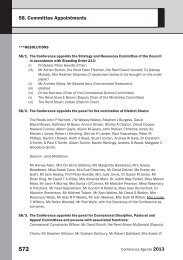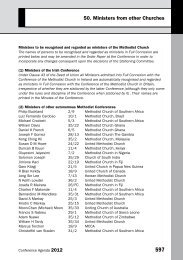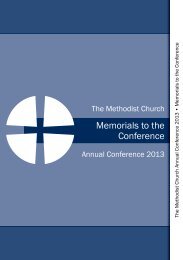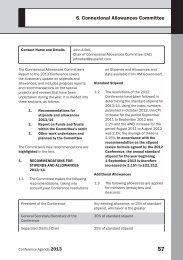Agenda Volume 3 - Methodist Conference
Agenda Volume 3 - Methodist Conference
Agenda Volume 3 - Methodist Conference
Create successful ePaper yourself
Turn your PDF publications into a flip-book with our unique Google optimized e-Paper software.
57. The Fruitful Field Project<br />
Christian communities of faith, hope<br />
and love. “Do not lag in zeal, be ardent<br />
in spirit, serve the Lord.” 16<br />
124 As a submission made by a District<br />
officer noted, it is important to<br />
support Circuits and Local Churches<br />
as they “reflect on the nature of<br />
their current discipleship, on their<br />
engagement with mission in their<br />
localities, and on how the Circuits<br />
and Local Churches need to make<br />
changes to the way in which they<br />
have operated in recent decades, in<br />
order to face up to the challenges<br />
of being Methodism in the current<br />
century.” Support offered here will,<br />
as a District officer’s submission<br />
noted, need to “recognise the impact<br />
of recent and on-going changes in<br />
ministry within Circuits. The Church<br />
will need ordained and lay people<br />
who are trained in approaches to<br />
collaborative ministry (in all its<br />
forms) in the new types of Circuit<br />
and Circuit missional aims and<br />
structures which are emerging in very<br />
different ways across the Connexion.<br />
This includes very different sizes of<br />
Circuits in different places, for good<br />
missional reasons. The pattern of<br />
the Church across the Circuits is now<br />
far less homogeneous and far more<br />
complex, with the level of complexity<br />
and difference developing rapidly.”<br />
The focus must be on the missionfocused<br />
context of Circuits and Local<br />
Churches, and on supporting apt and<br />
effective witness and presence in<br />
changing circumstances. As a District<br />
officer’s submission noted, “to be a<br />
discipleship movement shaped for<br />
mission that will be here in 20 to 30<br />
years time, the Church, and therefore<br />
its training and development, needs<br />
to be culturally and contextually<br />
relevant to the emerging cultures.”<br />
Scholarship, research and innovation<br />
125 The final core purpose of the Network<br />
is to nurture apt and excellent<br />
scholarship, research and innovation<br />
within the Network to inform, equip<br />
and challenge the Connexion:<br />
supporting academic studies and<br />
research projects, intentionally<br />
enabling and encouraging innovative<br />
and creative thinking across the<br />
Network, and ensuring that insights<br />
and outcomes are shared across and<br />
beyond the Network and the Church.<br />
126 As a submission from a tutor made<br />
during the consultation period noted,<br />
“the jury is out when it comes to<br />
the long term survival of theology<br />
as an academic discipline within the<br />
university. Nevertheless, the Church<br />
should be committed to the highest<br />
form of intellectual inquiry, and this<br />
would undoubtedly remain within<br />
the vocation of some people, places<br />
and pathways, but much more firmly<br />
rooted in the Church.” The <strong>Methodist</strong><br />
Church has a strong tradition of work<br />
in this area. A Circuit’s submission<br />
noted that British Methodism has<br />
“punched above its weight” in several<br />
theological disciplines, producing,<br />
16<br />
Romans 12:11<br />
692 <strong>Conference</strong> <strong>Agenda</strong> 2012



